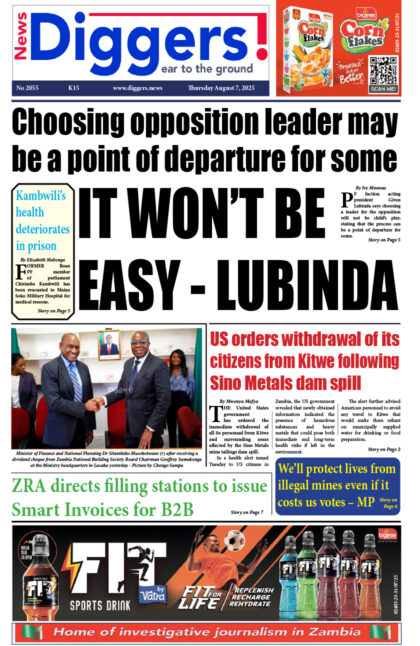Deputy Secretary to the Cabinet Christopher Mvunga says the legal tender in Zambia is Kwacha and there is no business house that is encouraged to price locally traded goods and services in foreign currencies.
In an interview, Mvunga revealed that government had received numerous complaints from the public concerning a growing practice among some business houses that have resorted to pricing goods and services in dollars, a move that he said was causing macroeconomic instability.
Mvunga who is also former deputy Minister of Finance, however, hastened to say government had no plans of introducing foreign exchange controls.
“The legal tender in Zambia is Kwacha and therefore pricing in this jurisdiction should be in Kwacha. The effect of pricing in Dollars means every time the currency moves, then goods and services are repriced, causing price instability and therefore we urge business houses to price in the legal tender which is Kwacha,” Mvunga directed.
“Zambia has a liberal exchange regime and therefore businesses that need dollars can easily convert kwacha to dollars using authorised financial institutions that are authorised currency dealers. But we don’t want to see businesses pricing in dollars and other foreign currencies. When people find those who are pricing in foreign currencies or in dollars, they have a right to react. And this is what we need News Diggers and other media to do, help us find out who is pricing in dollars. We are in Zambia and the local trading currency in Kwacha.”
Against a backdrop of the fluctuating Kwacha, Mvunga observed that the adverse effects of pricing and paying in foreign currencies were mainly felt by the general public rather than business houses that have Kwacha based operational costs.
“Those who are pricing locally traded goods and services in foreign currency risk facing undesirable reaction from the public and the government will not be there to support you. So it is also a challenge to you the citizens who must be vigilant and make sure that this trend is stopped. We should also state clearly that govt has no intention of introducing foreign exchange controls, because whenever we condemn this practice, the narrative is changed and perceived to mean that we want exchange controls, that is not true. We cannot be legislating each and every little things,” Mvunga said.
He went on to warn business houses that were ignoring the local legal tender, that they risked losing their supply contract with government.
“I would like to also urge all the procurement officers from all government institutions, don’t have any dealings or businesses that price locally traded goods and services in dollars. All houses that do business with government, if they are pricing in dollars, relinquish their deals. Dollarisation of prices is illegal and unjustifiable,” he said.
“It is a practice that undermines the macroeconomic stabilisation efforts that government is putting in place. The pricing in foreign currency implies that businesses are adjusting their prices to reflect the extent of the movements in the exchange rate and yet most of their operating costs are in Kwacha. So the adverse effects of pricing and paying in foreign currencies are mainly felt by the general public rather than business houses; this is because the public has no means of hedging against currency depreciation.”
Mvunga said it was unfair to quote prices in dollars when majority of citizens were getting paid in Kwacha.
“Further, it should be noted that Incomes of the majority of Zambians are in Kwacha, very few citizens get paid in dollars. Therefore, these are bound to bear the full impact of quoting prices in foreign currencies, especially if they are compelled to pay in foreign currency for domestically traded goods and services, such as, rentals and school fees. If left unchecked, the practice has the potential to increase the demand for foreign exchange and intensify pressure on the exchange rate,” said Mvunga.
























